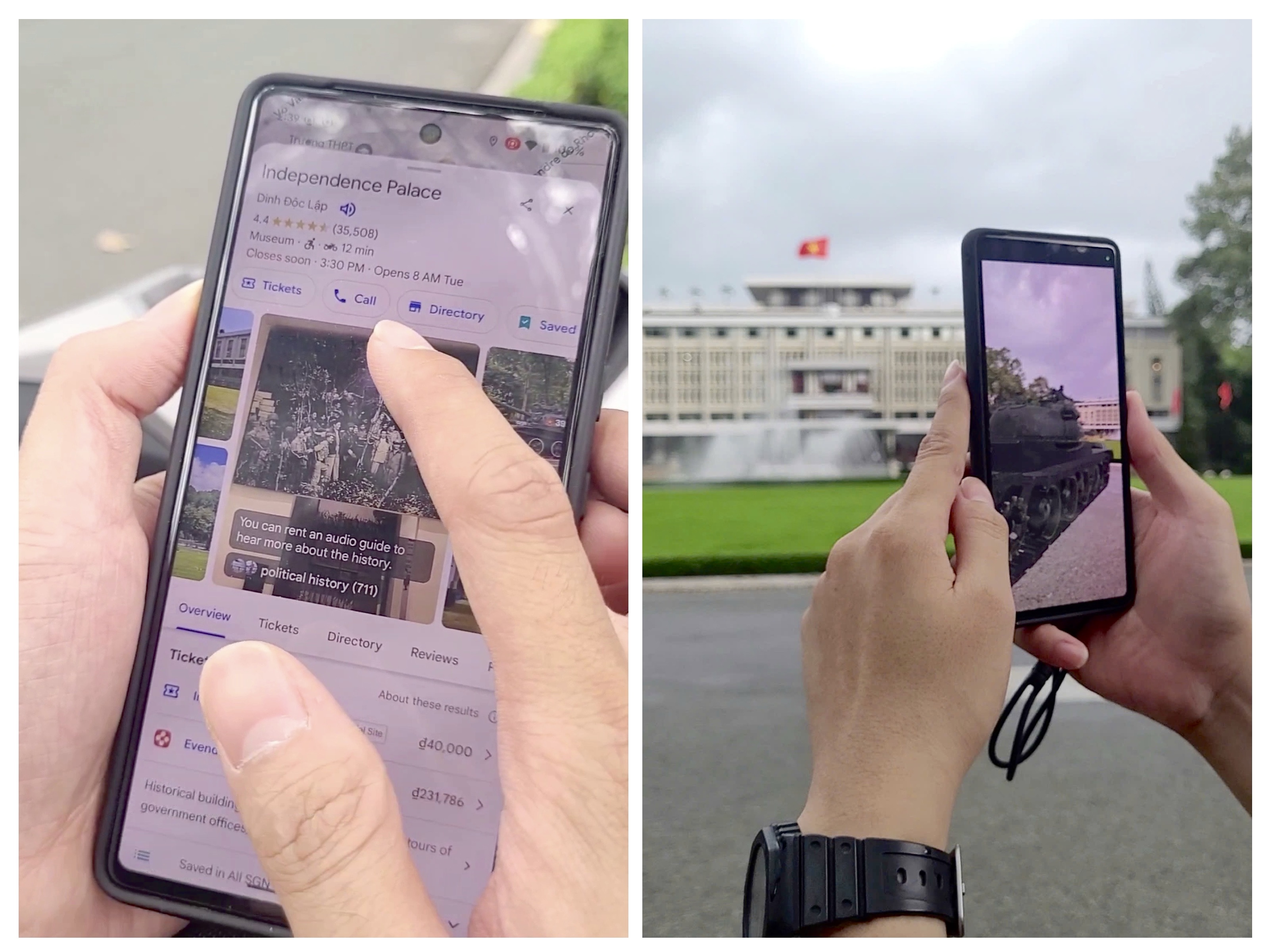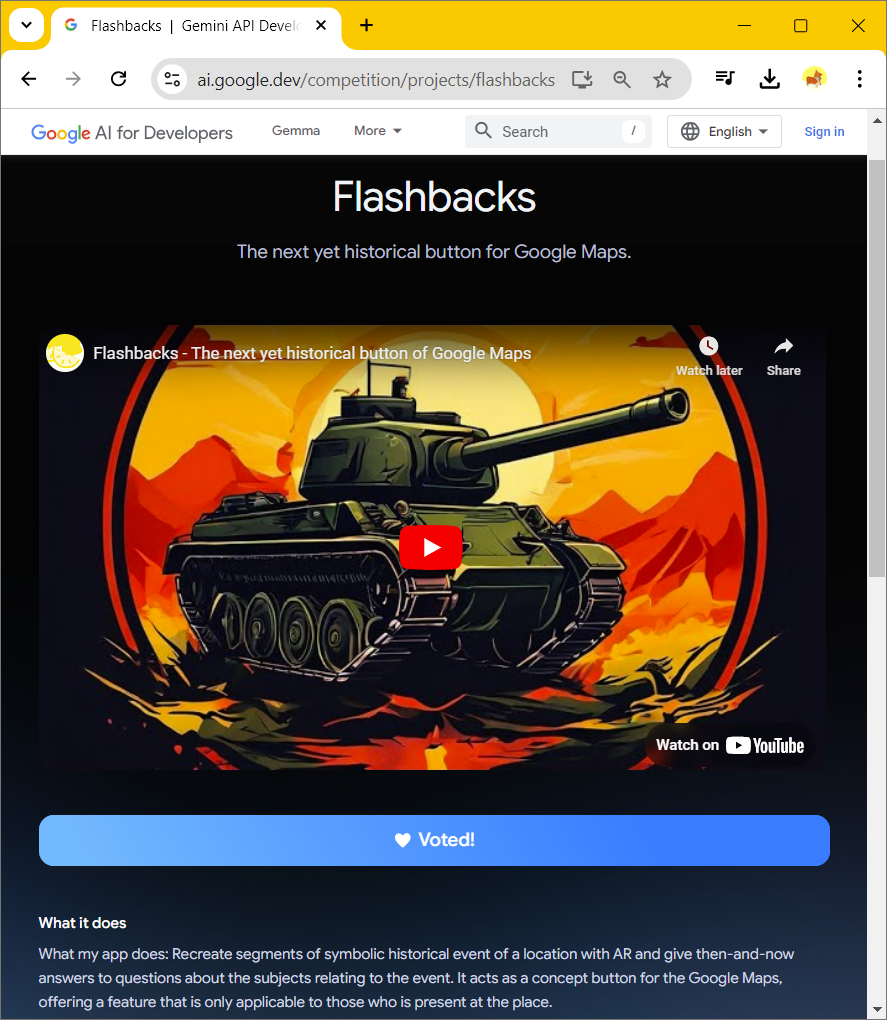- Published on
Google Gemini API Challenge
- SLAM and the Vietnam War
- Google Gemini API Challenge
Google Gemini API Challenge
As I delved into the Vietnam War, Google launched the Google Gemini API Challenge. Participants were required to build an application or game on any theme, using libraries developed by Google. Immediately, I chose ARCore as the focus for my product, simply because it uses SLAM underneath (to solve the motion tracking of the camera). With this library as the foundation, my project would take the form of an Augmented Reality (AR) application.
Ok then, I would create an AR application on top of my current interest—the Vietnam War.
The next question was, “How specifically would this be done?”
AR technology is designed to enhance user experiences in the real world with virtual elements. In Vietnam, historical experiences usually occur through lectures, videos, or visits to museums and historical sites. However, artifacts in the museum would not feature in my app because I feel my knowledge wasn't deep enough, nor did I think I could add significant value compared to what was already being done. After a few days of brainstorming, one evening when I was getting ready for bed, an idea struck me: I would enhance visitors' experiences at historical sites by recreating documentary scenes related to events right before their eyes. I am currently in Saigon, and what historical event is deeply rooted in the consciousness of the local people?
Certainly, it’s the noon of April 30, 1975.
App (business) model
The overall idea for the app was quite clear; the only thing left was to decide how it would be delivered: Is the app specifically for the Independence Palace? That’s too specific and lacks scalability. After a discussion with my girlfriend, I thought, why not consider it a new Google Maps feature? Instead of users just viewing photos, videos, and reviews about a location, they could see what events occurred there. Focusing on the use case of the Independence Palace, I thought if an international visitor came, saw the AR scene provided by the app, and learned that it marked the end of one regime and the rise of another, the experience would be astonishing.
Bingo! I settled on this model.
 |
|---|
| Flashbacks model: A menu button of a location on Google Maps, providing an AR experience |
The name of Flashbacks
The Oxford Learner's Dictionary defines the term flashback as follows:
a sudden, very clear, strong memory of something that happened in the past that is so real you feel that you are living through the experience again
History would be vividly recreated by Augmented Reality. Simply put, there's no better name than Flashbacks.
Wrap-Up
After several evenings spent brainstorming ideas, racing against the clock in the final days, taking two days off, and pulling an all-nighter before submission, I managed to create a very basic app that I’m quite proud of. I want to thank my girlfriend for her support in filming and editing the promo video. I'm also grateful to Google for organizing a challenge that reignited my enthusiasm. The process of connecting my passion for Vietnamese history with the tools provided by Google to develop this concept app has been truly fulfilling.
 |
|---|
| Flashbacks page on ai.google.dev |
You’ve just entered an American competition with a rather bold theme.
A friend’s remark during the Google Gemini API Challenge made me pause, equal parts amused and intrigued.
Amused because it echoed my own anticipation—that reenacting the fall of the Presidential Palace might highlight the collapse of the U.S.-backed South Vietnamese regime. For a patriotic American, watching Flashbacks’ demo could stir discomfort. Yet I chose to proceed. Because what happened that day remains legendary, a turning point etched into the consciousness of both nations.
I believe that, despite my little understanding of history and diplomacy, few nations share a relationship as uniquely intertwined as that of the U.S. and Vietnam. Few adversaries leave such indelible marks on each other’s historical trajectories. Above all, both countries have transcended a blood-soaked past to forge a forward-looking partnership. I deeply believe this represents a significant, poetic bond between two nations.
For now, I think it’s best not to elaborate further—at least until Flashbacks sees its next update. Thank you for taking the time to read my thoughts.